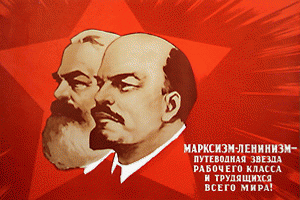Marx & Lenin
They're baaack!
Karl Marx and V.I. Lenin, although writing 80 years apart, predicted -- on paper at least -- the final convulsions of global capitalism. The long lines of their analysis are particularly helpful today, as our attention spans contract and we forget recent events that are heavily impacting our lives today. For example...
After 40 years of concentrated assault on our economy and culture by corporate capital and its media machine, we expect our current President to have fixed our problems in four years. Here's a two-act scenario that may serve to re-expose what's underlying all the election hysteria.
In
1848, Marx theorized that capitalism -- in this ultimate imperialist
stage -- would drag growing industrial and financial organizations (no
word for corporations yet) into a two-act transition from free-market, a
nation-state competition to bad economic theater on a global scale.
Act
I -- Marx's scenario: Monopolies eliminate competition, then gouge
consumers and workers. Next, free-market policies result in
overproduction of some goods and services and underproduction of others.
These laissez-faire policies, said Marx, will encourage economic crises
such as inflation, slumps, and depressions.
For
example, since government began deflating the educational system in the
1970s (educated working-class people get too "uppity"), and President
Ronald Reagan busted PATCO, the air traffic controllers' union in 1981,
middle America has been forced to accept lower wages or become
unemployed.
In
Marx's terms, workers become "pauperized." When the people working at
Wal Mart stop shopping at Wal Mart because they can't afford it,
capitalism is, in Marx's terms, "sowing the seeds of its own
destruction."
Act
II / Scene 1 -- Lenin's scenario: By 1916, Lenin had refined Marx's
self-destruct prediction. Lenin theorized that bank capital would merge
with industrial capital to create "finance capital." Like particulate
matter in deep space, finance capital coagulates into clusters that
reach critical mass in the creation of a financial oligarchy of
corporations. (Lenin called them "associations").
Next,
Lenin predicted that the export of capital would replace the export of
products or commodities, i.e., the things we make. In our lives, the
auctioning off of American industry (cars, ships, televisions, washing
machines, everything) to Japan, Korea, Europe and Southeast Asia has
followed Lenin's recipe of an economy based on selling -- not things that
we produce -- but finance.
Act
II / scene 2 -- Lenin's Scenario began in 1973, after the United States
lost the Vietnam War and Arabs shut off the oil. A service economy
slithered in to replace our former industrial, production-based economy.
Waiters
sold services to waiters and other servants. The servants took their
serving money and became tourists. Busy shipping piers were converted
into restaurants where the touring servants were served by other
servants who were not on vacation.
The
servants-serving-servants caper petered out, only to be replaced by the
digital boom, an information economy that sold data but" How much data
can you really sell?
When
information bubble burst, investors focused on building an economy
based on inflated real estate values. Banks and investment firms
collapsed. Now we're facing a social media bubble as it turns out the only monetization possible via the Internet is for the purveyors... like Facebook. And look where Facebook is at, with it's stock losing value daily.
Simply
put, both Marx and Lenin predicted that capitalism would eat itself.
Sure looks like it from here. So... Where are we now?
We're confronted with class warfare and civil uprisings from North Africa and the Middle East to the United Kingdom.
(Note: You can view every article as one long page if you sign up as an Advocate Member, or higher).






